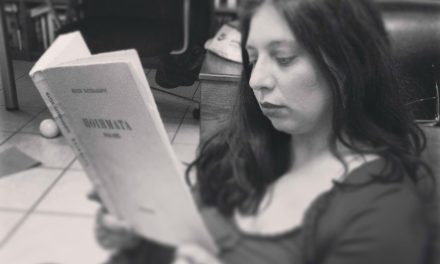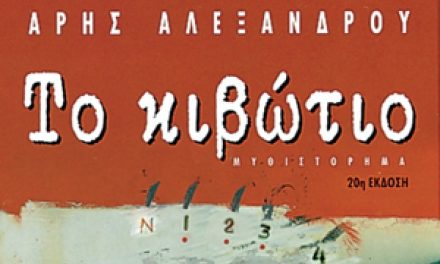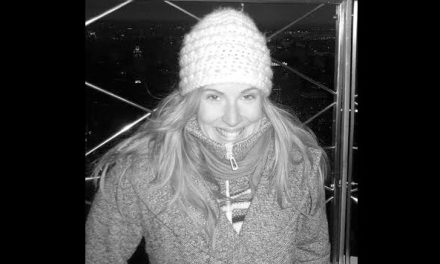Niki Chalkiadaki was born in Greece in 1980. She studied Greek Literature and Linguistics at the Aristotle University in Greece. She was awarded a postgraduate scholarship and completed a Master’s degree in ‘Creative Writing’ at the University of Western Macedonia in Greece. In 2013 at the National Symposium of Patra in Greece she was awarded the First prize for Best Poetry Book by a new poet for her second poetry book titled on my back with fever (published by Mandragoras, 2012). In 2014 she was short-listed for the Greek National Awards in Poetry for her poetry book on my back with fever. Little she-cannibals (published by Mandragoras, 2022) is her third poetry venture. She has worked as a copywriter, editor and tutor in Creative Writing. The last 10 years she resides in Scotland.

Your latest writing venture little she-cannibals was recently published by Mandragoras and received quite favorable review upon publication. Tell us a few things about the book.
The heretical American-Lebanese thinker, essayist and author Nassim Nicholas Taleb used to say that if you want to irritate poets, try to explain their poetry. I say you canannoy them even more…by making them explain their poetry themselves.
I worked on little she-cannibals more as a poetic composition with a specific stylistic temperature, thematic direction and linguistic structure. In the center are the same-sex members of a family formation who bring deviant and extreme behaviors to their relationships due to an initial trauma, which is, however, an excuse and not the actual cause for the reversal of a reassuring reality. The poetic subject is a child who is defined as a girl and who accepts and describes a dystopian family condition – and not only – as the norm and because of this traumatic misunderstanding a distorted worldview is created. A suffocating, (self)destructive microcosm is formed in the attempt of an inverted self-determination. Motherhood as the ultimate caring mechanism, education, society, religion and their displacement from holiness not for the profane but for the acceptance of their failure, because they entail the impossible.
A girl (with a juvenile voice and an adult memory) in order to escape, save and somehow fix herself, provides ravaging and unexpected solutions, more traumatic than the original trauma. A dive into a tender, terrifying, animalistic and dry space where the boundaries between the real and the imaginary are blurred.
From the cover (treating the book as an aesthetic object as well) I wanted readers to see a world of bitter conflicts, the choice of pink as a gendered, vulnerable and tender marker of a stereotypical imposition, the word she-cannibals which has a very specific literary meaning, also in our language – which includes gender in the endings- as a carrier (gender), and the adjective little for the oxymoronic and sarcastic attribute of an adjective’s quality and quantity that undermines rather than softens the original quality of the noun. I wanted the title to be in lower case and in a style – relief/intaglio – to look more like a scar, something that pushed the paper from the inside and the title on the cover to have a body (volume) instead of ink. I also wanted touch to be one of the senses to approach the book.
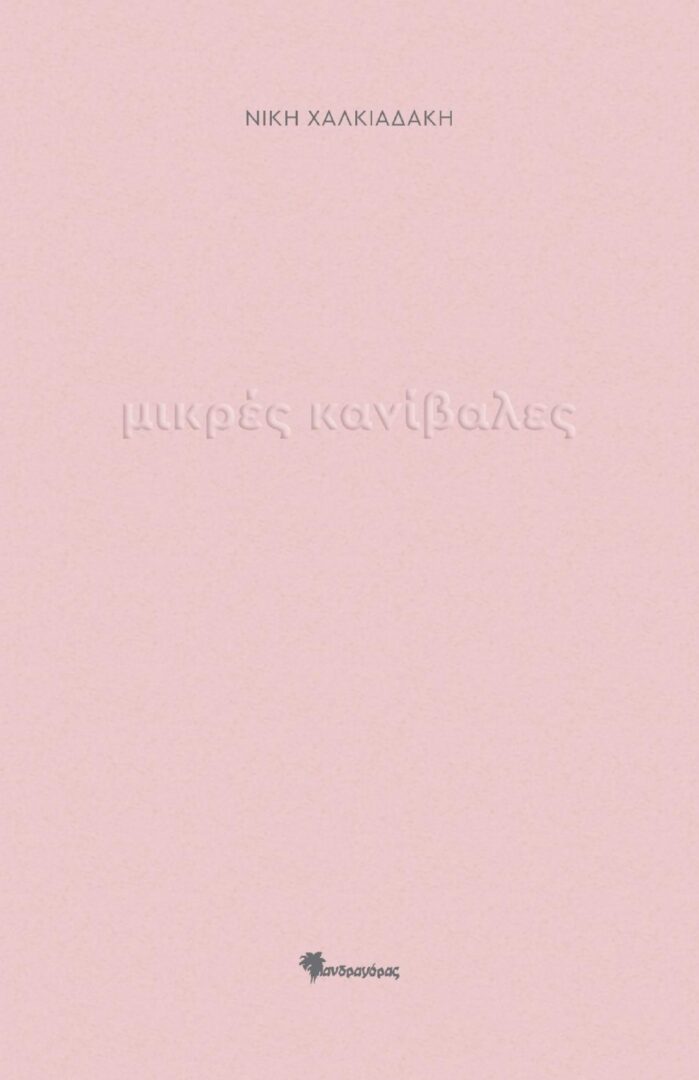
Ιn the words of Christina Linardaki, your poems talk about “the carelessness of childhood undermined by traumatic experiences, about girlish secrets but also childish indifference, about womanhood, about all that remains pending from a disfiguring wound and can be expressed through poetry”. How is trauma, whether deriving from childhood or the female nature, dealt with in your poetry?
A child – around the age I place my poetic subject – is a wonderful current being; adults may be wonderful but not characterized by currentness, they are haunted by the past and chasing the future, tending to miss the moment. Children are not affected by social or other conventions, they mix the real with the imaginary with enviable honesty, they create a language that deviates from the legitimization of the code as a principle of communication, they make descriptions not only with the eyes but with another kind ofvision. They speak mostly when they don’t speak, and when they do, their associative process is mostly unbalanced, irrational but magical, and their conclusions completely arbitrary, inconsistent but genuine. They have an unimaginable freedom to move in impudence and innocence without knowing and without caring. They hurt and are hurt deeply and indelibly.
These are some of the qualities I wanted to bring to little she-cannibals, that surprise both in terms of language and meaning. The child in little she-cannibals brought the brain process, the gender, the experience. I do not treat trauma in the book as a wound or as a traumatic and therefore emotionally charged or mournful point, but as an initial lack of something, which is responsible for a domino of misinterpretations, a pretense of evil. It is not the event but the management of any event, the transformer that you have by design or that was installed for you.
When you broke on a rainy day
When you broke on a rainy day
My mama is afraid of lightning
She won’t get out from under the table so I can comb her hair and bed her down
good night sleep tight my mama
she’s afraid of water, too, it might take her and never bring her back
She likes stories with deer, she thinks they are always female
she’s afraid of dad, too, who is not a deer
She’s afraid he might come back full of worms
and ask for her hand in marriage again
Don’t be afraid mama, I, knowing nothing of synecdoche
will cut your hand and give it to him
I won’t give you away whole
[Poems from the poetry book little she-cannibals translated by Lena Kallergi]
Ιrony, bitter sarcasm and a tough language that resonates as a cry of unspoken pain. What role does language play in your writings? Would you say that it is tailored to the era it pertains to?
Language is a common tool and its use makes it poetic or non-poetic. Words themselves cannot be hard or soft, good or bad except within the contexts they are placed in and surrounded by; there begins an endless associative branching of contexts both poetic and extrapoetic. It is difficult to place them in a row. I was looking for this row. And I don’t just mean the position of the word, but the sound, the conceptual framework, the semiotic imprint that makes the unfamiliar familiar, the innocent blasphemous, the serious comic, the tender horrible and the reverse through a mechanism that I wanted to cause surprise, not chasing cruelty as a poetic quality, but looking for the instantaneous and the unexpected. I wanted to undermine the dividing lines of a familiar normality and I had in my ear what Mallarmé said, that the task of poetry is to make new the words of race.
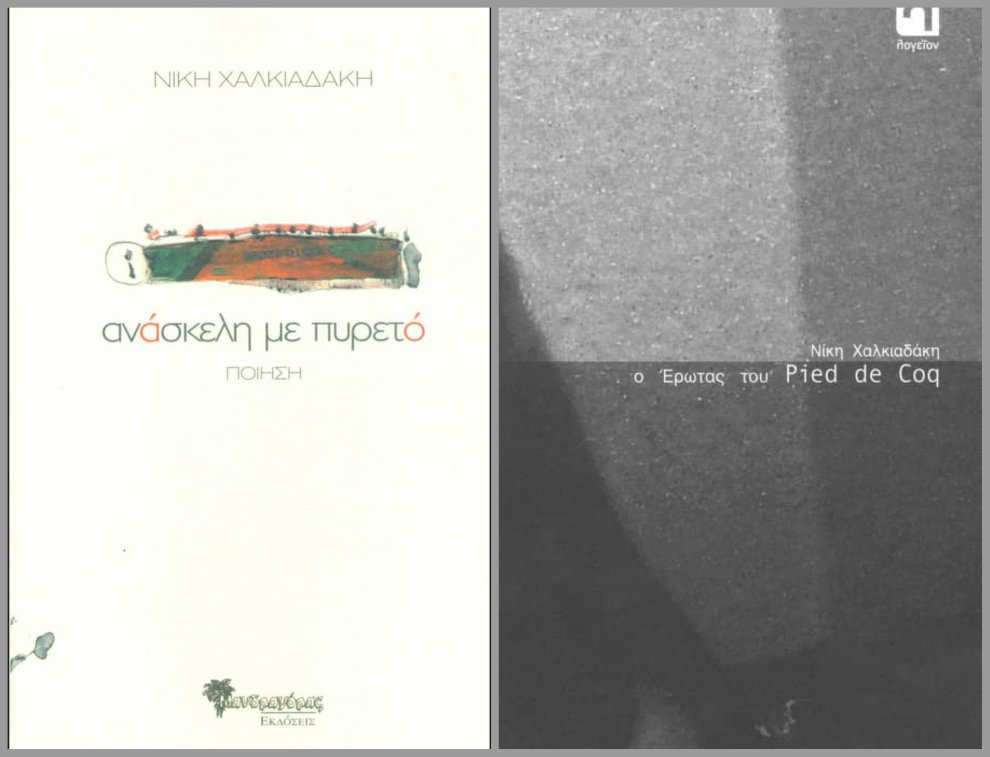
little she-cannibals was published ten years after on my back with fever. What has changed and what has remained the same in your poetry? Are there recurrent points of reference in your books?
I like to think that as I get older I get rid of, or tend to get rid of, the unnecessary. I am closing the gap, keeping the angle small. The personal thus becomes more universal and then personal again. To put myself in and take myself out. I try to rein emotions and wits. The experience should remain vibrant, without stinginess but never raw. Economyοf speech, abstraction and precision, conciseness, consistency and always a dose of something you don’t have. But whatever is said, if it doesn’t show in the work it’s among the unnecessary I’m trying to get rid of. Scientists, researchers, athletes, craftsmen, thinkers, writers work mainly with repetition.
Anger
Had you known I was made of glass
you wouldn’t have thrown me against the wall
You would have waited for me to grow up
And had I known you were going to die
I would have washed your feet every day
But had I washed your feet every day
you wouldn’t have died. You would still be in the room next-door
I never thought you could fit in a plastic basin
In a green plastic basin
You never thought I would wash your skull
in the sink with the rubber tap without crying
They have turned wild, the people, the birds, the waiters
And you, in a tin box, what can you do for me now
And I, with two standing feet, what can I do for you
[Poems from the poetry book on my back with fever translated by Lena Kallergi]
In the last few years there has been an extraordinary burgeoning of poetry in every form: graffiti, blogs, literary magazines, readings in public squares. How is this strong civic presence to be explained? Could poetry offer new ways to imagine what can be radically different realities?
I don’t know if this extrapoetic condition is measurable in a poetic pulse. A certain poetic extroversion is observed at times that attempts to communicate this lonely, slow and internal combustion process and at other times tries to exploit it for reasons unknown and indifferent to poetry. There is also a strong interartistic, intercultural – and any other – trend which has included poetry in traditional or hybrid forms; on the other hand, there is also a superficial or commercialized use of it on the rise (Cavafy in invitations for weddings and christenings, Elytis in pre-election campaigns, advertisements, etc.). If you ask me the former is more suspicious, because the latter is naive and easily understandable.
The present era seems to be introspective,narcissistic, fragmented, somehow cut off from the whole, therefore extremely closed and absolute, rigid and without a center, neurotic, inflexible and highly self-referential. Everywhere a buzzword, a piece of advice, wisecracks, a verse, a quoting of life on a vertical axis, in a perpetual scroll down, all in capsules: 10 ways to be happy, to lose weight, to excel and other bulimic wills and somewhere in there a little Kalvos, Rimbaud, Sappho because it’s world poetry day.
Υet, I have to say that among all these there are also exceptional cases of people or small formations (literary magazines, publishing houses, translators, workshops, events, fellow and foreign artists) that turn the sharing of poetic art rare and profound. Fortunately, poetry is not there to offer, but to be offered. I will share what has always been on my mind perhaps a little more than it should. One of my favorite teachers, Stratis Paschalis, used to say that one of your feet should be out of poetry.
How do young writers converse with global literary trends? Where does the national and the local meet the global and the universal?
They have always been conversing. The elective affinities were then of extraordinary interest for many reasons. It’s evident in the fact that not only translators but also writers laboriously found and translated their fellow writers, if I may call them so, because they sought such conversation. Seferis Eliot and Pound, Elytis Éluard and Lorca, Gonatas Porchiaand countless other examples. In the past, we waited for the translations, the few interviews, the publications like cherries in spring. Now this kind of conversation seems easier, technology, that is, the medium, favors exchange and movement. Festivals, social media, platforms, broad linguistic knowledge, Google Translate (we trained it very well already), Artificial Intelligence, intercultural events, travel, many translations, workshops, intense artistic, trans-artistic and all other such trends. Of course, the easy must be interrogated, because there is always a new kind of danger hidden that is by default detected later on.
*Interview by Athina Rossoglou
TAGS: LITERATURE & BOOKS

